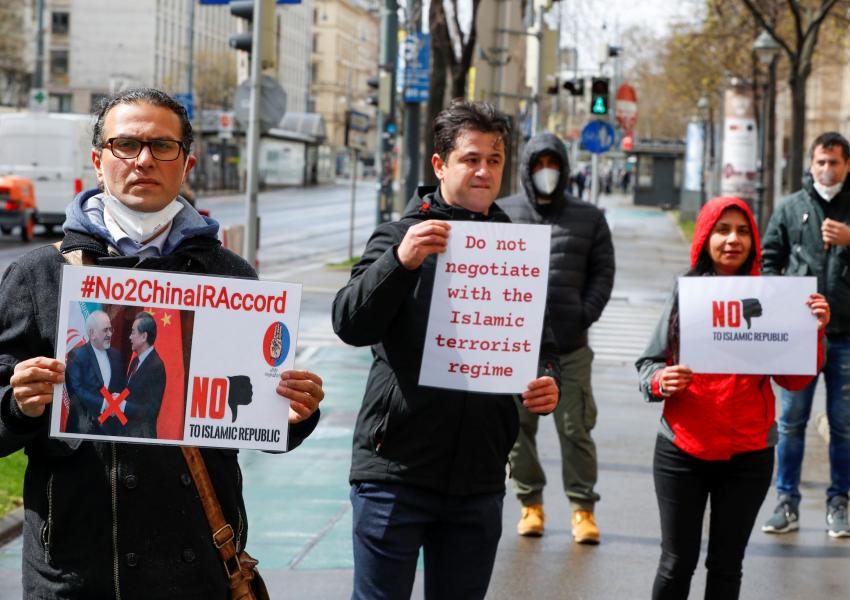
‘Ordinary’ Iran Nuclear Meeting Opens In Vienna, As US Envoy Nearby
A Vienna meeting over reviving Iran’s 2015 deal with world powers opens today [Tuesday April 6] 14.30 local time. Described by Iranian foreign ministry spokesman Saeed Khatibzadeh on Monday as a long-scheduled “ordinary” meeting of the deal’s joint commission, it is anything but.
The Austrian capital is a flurry of activity. Braving slogan-chanting Iranian protestors, Abbas Araghchi, Iran’s deputy foreign minister, spent the first part of the day in a series of meetings with other delegations representing the deal’s remaining signatories: Russia, China, France, Germany and the United Kingdom. These included Enrique Mora, the European Union foreign policy chief.
Reports say Iranian protesters tried to approach Araghchi as he was leaving a hotel and the police had to intervene to shield him from those who believe the talks aimed at returning the US to a "flawed" deal and giving sanctions relief to Iran is wrong. Iran International reporter in Vienna says that as a protester shouted questions about the recently signed Iran-China 25-year agreement, Iran's chief diplomat in Vienna Kazem Gharibabadi insulted the individual, saying "get lost".
Reuters reported that a United States delegation including special envoy Rob Malley is based in a hotel near where the formal talks of the joint commission of the Joint Comprehensive Plan of Action (JCPOA) would take place. A Western diplomat told Reuters that he expected shuttle-diplomacy involving the Americans, with France acting as interlocutor.
All sides agree on the desirability of reviving the JCPOA, which the US left in 2018 before imposing draconian sanctions that prompted Iran to expand its nuclear program beyond JCPOA limits. After that, there is less agreement.
Tehran has repeatedly rebuffed any discussion with Washington until the US lifts sanctions and returns to JCPOA structures. US president Joe Biden has said he expects Iran to return its nuclear program to JCPOA limits before he lifts the ‘maximum pressure’ of his predecessor, President Donald Trump.

The NPR quoted the US Iran envoy Rob Malley on Tuesday as dismissing Iran's posture that US sanctions are illegal and must be removed before it changes its behavior, saying "It is not going to work that way".
The challenge in Vienna is overcoming both Iranian and US preconditions and allowing both Tehran and Washington to announce success. An EU official told Reuters that the Vienna meeting would establish groups to work on the specifics marrying lists of sanctions that the United States could lift and nuclear obligations that Iran should meet.
Such a course was called for back in December, even before Biden took office by Rafael Mariano Grossi, head of the International Atomic Energy Agency, when he pointed out that reviving the JCPOA required a plan to sequence US and Iranian compliance.
Given the complexities - even aside from domestic critics in the US and Iran - all sides are playing down expectations of an early breakthrough. "We are not optimistic nor pessimistic about the outcome of this meeting now, but we are confident that we are on the right track, and if America's will, seriousness and honesty is proven, it could be a good sign for a better future for this agreement and ultimately its full implementation," Iranian government spokesman Ali Rabiei told reporters.
Mohammad Bagher Ghalibaf (Qalibaf), the parliamentary speaker, told Fars news that the Vienna meeting, presumably because the process had no direct US involvement, showed “the greatness of the Islamic Revolution and [that] the Americans have knelt before us.”
Government spokesman Ali Rabiei on Tuesday said Iran welcomed Saturday’s remarks from Malley over lifting sanctions inconsistent with the JCPOA and that Washington had no other way of “ending its lawbreaking behavior.” Rabiei told his weekly video press conference that “we are in the beginning of the process of revival of the JCPOA.”





